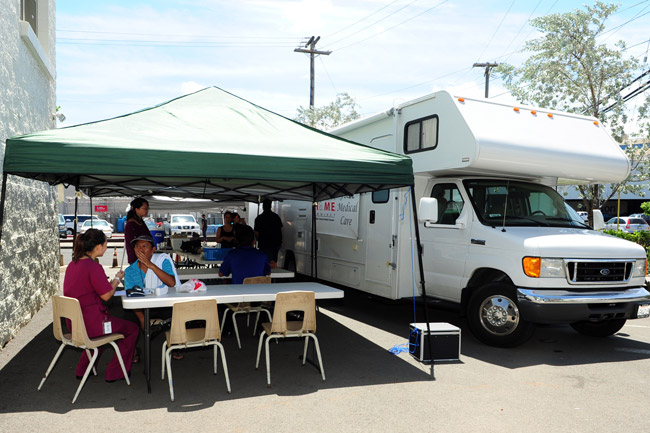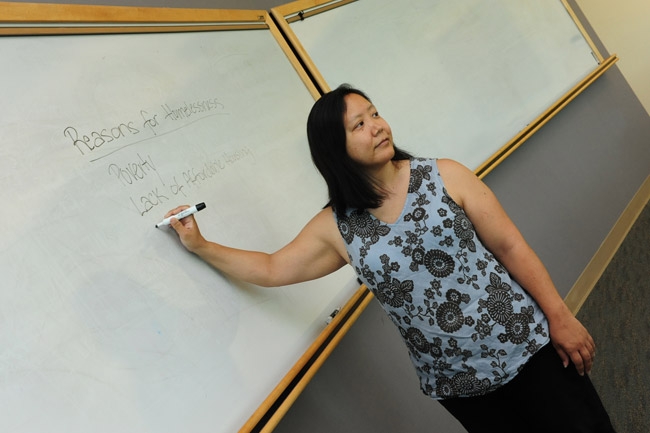HOME Is Where The Med Students Are
Homeless people need medical care. Medical students need patients. UH’s Dr. Jill Omori created HOME to address both problems
It is rare in life for two deficits to come together to create a positive, and rarer still for them to create a residual good that should impact future generations. But that is exactly what you have with the Hawaii HOME Project.
mw-nm-082113-h-o-m-e-2
The acronym for Homeless Outreach and Medical Education encompasses both deficiencies it intends to fill by providing medical care to those who need it but can’t get it – the homeless – while providing UH medical students with what they lack the most – living, breathing patients.
First started in 2005 as the vision of family physician Jill Omori as a way to get medical help to the underserved, it now functions as a four-year outreach program for students that informs their world view upon graduation.
“At that time, I felt like there wasn’t very much in the way of curriculum for underserved care for medical students, and that was a passion of mine,” says Dr. Omori, who serves as associate director of the Office of Medical Education at John A. Burns School of Medicine. “When I came through medical school, the types of patients I found the most gratifying to work with were the underserved, and family medicine lends itself to outreach.”
Their first clinic was at Next Step shelter right next door to the med school in Kaka’ako, and has been quickly followed with clinics in Waianae, Kalaeloa, the Institute for Human Services (IHS) and the First United Methodist Church in Honolulu.
“We function just like a regular clinic,” says Dr. Omori, who runs the clinic out of a donated RV surrounded by pop-up tents. “We do acute and chronic care, minor procedures and preventative screenings (pap smears, pelvic or breast exams), provide free medications for those without insurance, as well as X-rays and ultrasounds.”
It may look like a regular clinic, but it is staffed entirely by medical students and overseen by volunteer physicians. Pre-med students serve as receptionists, and first-year students as medical assistants, checking in patients, taking vital signs and performing any injections that are necessary.
Second-year students manage the clinic, with the third- and fourth-year students working as the actual attending physicians. While the program is not funded by the school, it does serve to fill certain elective credits for the students and provides them with the all-important face-to-face work with actual patients – all while enforcing the idea of doing the most good for their community.
“I want my students to graduate feeling that community service is part of being a doctor, giving back,” says Dr. Omori, who has 130 students involved in the program this year. “I always remind them that this is a public medical school – the public is supporting their education – so they should give back.”
Though the program is not compulsory, Dr. Omori has found that once students get involved, they want to stay involved, like fourth-year medical student Jodi Kagihara.
“I had a little experience doing community service at Waikiki Health Center, but I just didn’t know that much about taking care of the homeless, and that piqued my interest,” says Kagihara, a Punahou graduate who is specializing in internal medicine. “It definitely has changed my thinking. Initially, it is easy to place judgment on the homeless and why they are, but this project broke down those barriers, and you realize there are real reasons for them being homeless, including health issues. It really opens your eyes that they are people who have fallen into an unfortunate situation that you could find yourself in as well.”
It is this connection between poor health and finding yourself down on your luck the program is highlighting for these students.
“It definitely plays a role in getting them off the streets and into shelters and back to work,” says Kagihara. “It helps them move up. Many times, the reasons why they are homeless is because of their poor health. By getting them healthy, they can then find jobs and make money.”
She also is one of the founders of a second group within the project called HYPE, Hawaii Youth Program for Excellence, which they designed to help out homeless teens and the issues they face.
“We find the little kids tend to do OK, but when they become teenagers they start to really feel the effects of being homeless, they go through a lot more problems at school with their friends,” says Omori.
So the students split their time between education courses with the teens on career counseling, STD prevention and Internet safety, and activities that the kids usually miss out on because of their family situation, such as hiking, ice skating and going to the water park.
“HYPE makes a big difference providing mentorship to the teens,” says Kagihara. “We had a kid who needed computer access to finish his high school classes, and we gave it to him here at the school so that he could. It was very rewarding.”
Dr. Omori does generate some funds for the charity through grants, but the majority of the money for the program comes through its annual fundraiser, A Taste of Home. This is its fifth annual event, and it will be hosted Aug. 31 this year at the medical school.
There will be entertainment by Koa Road and food provided by town, Tanioka’s Seafood and Catering, Little Soul Café and the KCC Culinary Institute, and a wine tasting led by Nathan Iha of Fujioka’s Wine Times. Tickets cost $75, with all proceeds going to fund the HOME project and its work for the students and needy alike.
“One of the hopes of starting a program like this is to show the students that it does not take much to give back to the community, and that even when they are out in practice, if they just volunteer once a month, it really makes a difference,” says Dr. Omori. “Our first students through the program just graduated from residency, and the one student who stayed here in the Islands now comes out to volunteer. It is kind of nice to see it come around full circle.”
For tickets or more information on the Hawaii HOME Project, visit its website at hawaiihomeproject.org or call Dr. Jill Omori at 223-8859.







